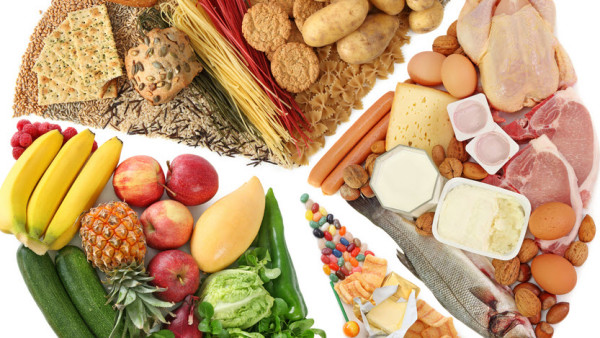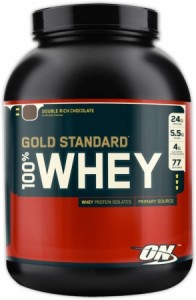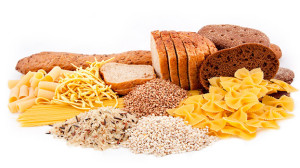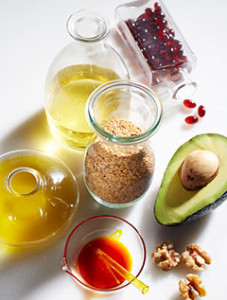
How do I determine the macronutrient ratios in my diet?
As you probably already know, food consists of three macronutrients (protein, carbohydrate and fat) and many more micronutrients (minerals, vitamins, etc). Knowing what your food is composed of is essential if you want to fine-tune a diet to your individual needs or tailor one from scratch. There are many conflicting opinions about which is the “best” protein/carb/fat ratio, and even governments are participating with recommendations that are supposed to apply to everyone, but the truth is more complicated. Everyone should consider their goals when determining how much protein/carbs/fat to eat and as such, it’s helpful to know a bit more about these macronutrients.
Protein

Many people use whey protein to reach their daily recommended intake since it’s easier to digest than meat and takes less time to prepare.
Proteins make up our muscles and other tissues, so it’s very important to have adequate intake to make sure your body never has to resort to breaking down muscle for energy. When trying to build muscle it should be evident that you need a surplus of protein since the body cannot synthesize certain amino acids. Though how much protein do you actually need? This is the subject of the one the longest standing discussions in nutritional science and there is no straight answer. The RDA is set at 0.8 grams per kilogram of bodyweight, though bodybuilders typically recommend 2.2 g/kg (one gram per pound) or higher. Based on studies too numerous to list I’m setting my personal minimum intake at approximately 2 g per kg of lean body mass since this amount isn’t harmful and eating more doesn’t seem to provide any beneficial effects. I base my protein intake recommendation on lean body mass because adipose tissue hardly has protein requirements.
Eating higher quantities of protein generally isn’t harmful as long as you don’t go overboard, but if it’s recommendable to do so depends on your goals. For weight loss it’s not a bad idea to have a diet which derives up to 25% of its calories from protein since protein increases satiety, meaning you’ll feel full for a good time after eating, which is helpful when trying to decrease total calorie consumption. When trying to gain muscle mass I would stick with my earlier recommendation since eating higher amounts of protein has no apparent benefits and could possibly result in an increase in the occurrence of kidney stones. Personally, I’d rather play it safe than end up squeezing small pointy rocks through my urethra.
I would recommend “Dietary protein for athletes: From requirements to optimum adaptation” by Tipton and Wolfe if you want more in-depth information about the effects of protein consumption in athletes.
Carbohydrates

For most people these are the main sources of carbohydrates.
For a long time, carbohydrates were considered the staple of any diet. Who doesn’t remember the food pyramid with rice, pasta and bread forming the foundation? Then, Dr. Atkins and other supporters of low-carbohydrate diets came along, resulting in a lot of controversy and confusion. Are carbohydrates good or bad for you? Again, it depends on your goals. Before explaining this in more detail, I’d first like to clarify the terminology I’ll be using to avoid misunderstandings. If you’re already familiar with it, feel free to skip the next paragraph.
What are carbohydrates?
Carbohydrates, also referred to as carbs or saccharide, are grouped depending on their size/weight into monosaccharides, disaccharides, oligosaccharides, and polysaccharides. The first two being the lightest and least complex are also referred to as sugars. Table sugar for instance is a disaccharide which is broken down very quickly when ingested into glucose and fructose, which are monosaccharides. Starches are long and sometimes branched chains of polysaccharides. Foods containing starch include vegetables, and whole grains. Carbohydrates stored in the body is known as glycogen.
Should I eat carbohydrates?
If you’re trying to lose weight, then you could benefit from a low-carbohydrate diet. One could fill a library with studies detailing how your body reacts to carbohydrate restriction, but I’ll keep things very simple. Carbohydrates are broken down to simpler sugars once ingested. The speed at which this happens is determined by the complexity of the carbohydrate and fiber content. Generally, complex carbs are labeled “good” because they take longer to digest and doesn’t create as big a peak in blood-glucose levels as simple carbs would. These simple sugars and their associated blood-sugar spikes are usually labeled “bad” because they result in the release of insulin from the pancreas. This hormone regulates the carbohydrate and fat metabolism. High insulin levels stop fat being used as a source of energy since the body can more readily use glucose.
If your goal is to build muscle, then you absolutely need insulin since this hormone is responsible for shuttling nutrients into skeletal muscle to replenish glycogen and repair damage caused by training. Your body is in a unique metabolic state after an intense weight training session and the bulk of carbohydrates consumed will be consumed by muscle tissues instead of fat cells. The longer and more intense the workout was, the more glycogen needs to be replaced. It’s a bit tricky to figure out exactly how many grams of carbohydrates you will need to fully replenish glycogen stores unfortunately. Too little and you will not achieve maximal muscle hypertrophy, too much and you will be growing your fat cells as well.
Lipids

Avocados, salmon and olive oil are very healthy sources of fat
Fats as you probably know are the most calorie-dense of all macronutrients at nine calories per gram. They also have the worst reputation even though they are essential nutrients and some fats might even help us burn body fat. It’s important to make a distinction between these “good” unsaturated fats which itself comes in two varieties. Monounsaturated fats are found in olive oil, avocados, most nuts and seeds. Polyunsaturated fats are found in oily fish such as salmon, soybeans and walnuts. These fats are generally liquid at room temperature because of their chemical structure.
The “bad” saturated fats on the other hand are usually solid and can be found in cream, butter, hard cheese, meats, and coconut oil for instance. Trans fats, which have gotten a lot of attention lately, are unsaturated fats which have been chemically altered (hydrogenation) to harden them into saturated fats. The resulting chemical structure is rare in nature, which is likely why our body reacts to them in such a poor manner. Studies indicate that these synthetic fats can increase unhealthy LDL cholesterol and lower healthy HDL cholesterol.
This post is also available in: Spanish
